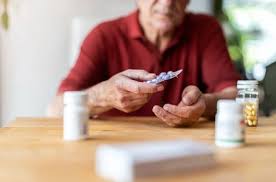
As we age, many individuals find themselves increasingly reliant on medication and painkillers to manage chronic pain and other health conditions. While these medications can provide significant relief, there comes a time when it may be beneficial to explore alternatives and reduce reliance on these substances. According to a recent report, approximately 40% of older adults are prescribed painkillers, often leading to concerns about dependency and side effects. This article aims to provide guidance on how seniors can gently ease off medication and painkillers, promoting a healthier, more balanced lifestyle.
Understanding the Need for Change
The first step in reducing reliance on medication is understanding why it is necessary. Many seniors may experience side effects from long-term use of painkillers, including gastrointestinal issues, cognitive decline, and increased risk of falls. Additionally, the potential for addiction or misuse should not be overlooked. A visit to a drug treatment centre can provide valuable insights into the risks associated with prolonged medication use and offer support for those looking to make a change.
Consultation with Healthcare Professionals
Before making any changes to medication regimens, it is crucial for seniors to consult with their healthcare providers. A thorough evaluation of the individual’s health status, current medications, and pain management needs will help determine the best approach to tapering off painkillers. Healthcare professionals can also recommend alternative therapies, such as physical therapy, acupuncture, or cognitive behavioral therapy, which may provide effective pain relief without the need for medication.
Gradual Reduction of Dosage
One effective method for easing off medication is to gradually reduce the dosage rather than stopping abruptly. This approach helps the body adjust to lower levels of medication, minimizing withdrawal symptoms and discomfort. Seniors should work closely with their healthcare provider to establish a tapering schedule that is both safe and effective.
Example Tapering Schedule
Week 1: Reduce the current dosage by 25%.
Week 2: Maintain the new dosage and monitor for any withdrawal symptoms.
Week 3: If stable, reduce the dosage by another 25%.
Week 4: Continue to assess pain levels and adjust as necessary.
Incorporating Non-Pharmacological Treatments
In addition to tapering off medication, seniors can explore various non-pharmacological treatments to manage pain effectively. These may include:
Physical Exercise: Engaging in regular physical activity can strengthen muscles, improve flexibility, and enhance overall well-being. Low-impact exercises such as walking, swimming, or yoga are excellent options for seniors.
Mindfulness and Relaxation Techniques: Practices such as meditation, deep breathing, and progressive muscle relaxation can help reduce stress and alleviate pain.
Dietary Adjustments: A balanced diet rich in anti-inflammatory foods, such as fruits, vegetables, whole grains, and healthy fats, can contribute to overall health and pain management.
Heat and Cold Therapy: Applying heat or cold to painful areas can provide immediate relief. Heat can help relax muscles, while cold can reduce inflammation and numb sharp pain.
Support Groups: Connecting with others who are experiencing similar challenges can provide emotional support and practical advice. Many communities offer support groups for seniors seeking to reduce medication use.
Monitoring Progress and Adjusting Strategies
As seniors embark on this journey to reduce reliance on medication, it is essential to monitor progress closely. Keeping a pain diary can be an effective way to track pain levels, triggers, and the effectiveness of alternative treatments. Regular follow-up appointments with healthcare providers will also ensure that any necessary adjustments to the tapering plan can be made.
Emphasizing the Importance of Patience
It is vital for seniors and their caregivers to approach this process with patience and understanding. Reducing reliance on medication is not an overnight task; it requires time and commitment. Celebrating small victories along the way can help maintain motivation and foster a positive outlook on the journey to improved health.
Easing off medication and painkillers is a significant step for seniors seeking to enhance their quality of life. By consulting with healthcare professionals, gradually reducing dosages, and incorporating non-pharmacological treatments, seniors can manage their pain more effectively while minimizing the risks associated with long-term medication use. With the right support and strategies, it is possible to achieve a healthier, more balanced lifestyle that promotes both physical and emotional well-being.